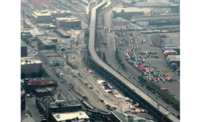Washington Gov. Jay Inslee (D) announced a plan to restart low-risk construction in the state, even amid a stay-at-home order that remains in place until May 4. Inslee plans to sign the order today, which will allow any project that can resume with social distancing to begin immediately.
“We’ve been following a plan for reopening the economy and today I’m glad to say we have reached the first step of the plan,” said Inslee at an April 24 press conference. “We found a way to safely allow low-risk construction that is underway to resume.”
[For ENR’s latest coverage of the impacts of the COVID-19 pandemic, click here]
In an effort to promote safe construction, Inslee asked an advisory group, made up of the Associated General Contractors of Washington, Building Industry Association of Washington, Association of Washington Business, Washington State Building and Construction Trades and the unions for Operating Engineers and Carpenters, for a list of recommendations that allow for the restart of at least some construction projects. The group offered a multi-phased approach in a letter and four-page response on April 14.
During the press conference on April 24, Inslee — with representatives from each of the six groups joining virtually — said there is a “general obligation to keep a safe and healthy worksite.” Inslee also called the plan an “intelligent way, on an incremental basis” to allow the industry to move forward and serve as a template for other industries.
In phase one of the group’s recommendations, the proposal includes an immediate restart of low-risk construction projects where social distancing is easily maintained. The recommendations also include a 30-item list of COVID-19 precautions that all jobsites will be required to meet. The recommendations do not delineate between types of projects but focus on any type of project that can meet the safety requirements. Inslee says now is the right time to move forward on these recommendations.
Inslee called the effort a model of how other industries can come together in the state. “This process has got us where we know hard-working people of good faith can reach good agreements as we rebuilt our state,” Inslee said.
Mark Riker, executive secretary of the Washington State Building and Construction Trades, says by working together the construction industry in the state came together to find a way forward. He also had a call to workers across the state. “It is our job to do it right,” he says. “if we do it right, we will move to the next step. If we do it wrong, we will be shutting ourselves down.”
Greg Lane, vice president of BIA, says construction workers across the state are “eager to get back to work and are extremely committed to all the requirements in this plan because we know that is what is necessary to keep all our employees safe.”
The delay between the recommendations and Inslee's action prompted BIA members on April 17 to send over 1,200 letters calling for action. “We wanted this to happen last week,” Jennifer Spall, communications director for BIA, said on April 23. “Forty-five other states are not in this position. We want it as soon as possible.”
Earlier in the week David D’Hondt, executive vice president of AGC of Washington, said “some commercial construction, residential construction and road building would likely make up the bulk of phase one projects.” Inslee says it may be possible for the Washington State Dept. of Transportation to restart some projects.
The group says a second and, possibly, a third phase will be needed to address more complicated worksites.
“The employer and labor members are united in their belief,” D’Hondt said, “that we have created a plan for safe phase one jobsites.”
On March 23, Inslee announced his initial stay-at-home order, and on March 25 provided a clarification to the construction industry, writing that “in general, commercial and residential construction is not authorized under the proclamation because construction is not considered to be an essential activity.”
The governor has allowed local governments, including school districts, to make determinations about public infrastructure construction within their own jurisdictions. Inslee directed the Washington State Dept. of Transportation to pause most of its projects, excluding critical projects, and Sound Transit followed suit on a mix of its projects April 6.
Skanska, for example, one of the largest contractors in Washington, is still working on two school projects for the Vancouver Public Schools in southwest Washington, says Todd Predmore, vice president and account manager for Skanska USA Building.





Post a comment to this article
Report Abusive Comment